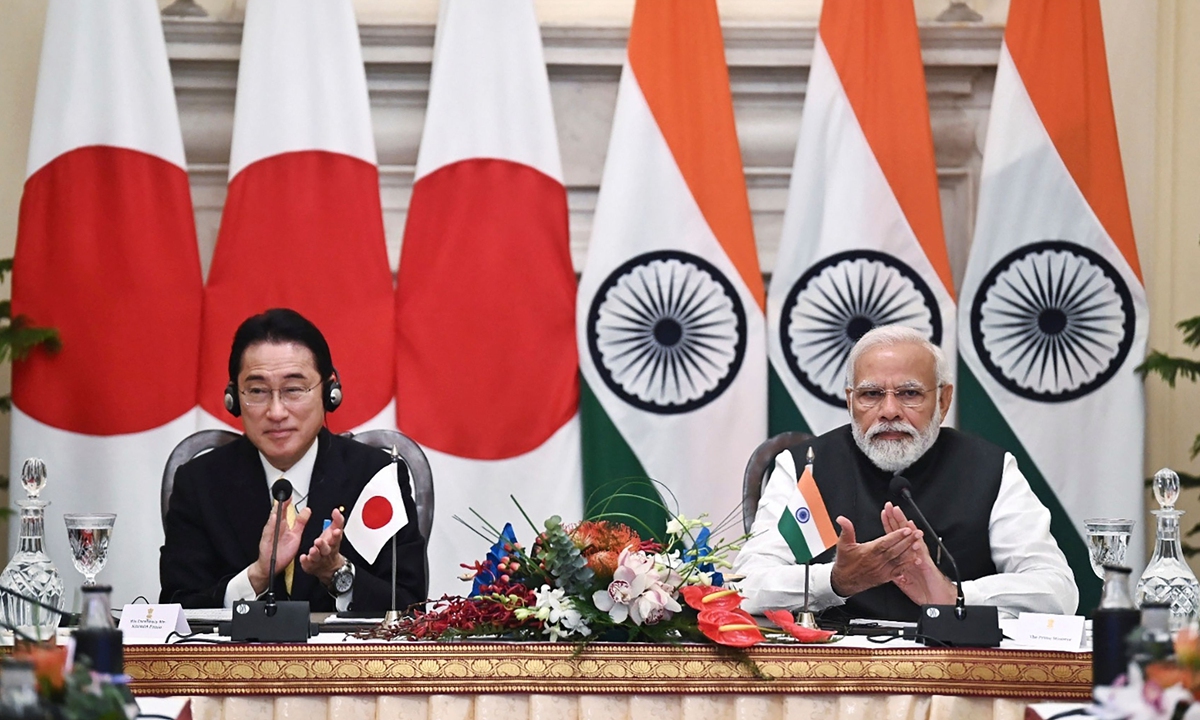
Japan's Prime Minister Fumio Kishida (left) and his Indian counterpart Narendra Modi applaud during their meeting at the Hyderabad House in New Delhi on March 19, 2022. Photo: VCG
Japanese Prime Minister Fumio Kishida failed to persuade India to take a similar position over the Ukraine crisis as its partners the US, Japan and Australia in the Quad mechanism during his meeting with his Indian counterpart Narendra Modi, given that the joint statement published following the meeting did not mention Russia, let alone imposing sanctions against Russia.
Although Kishida pushed Modi on Saturday to take a tougher line on Russia over the Ukraine issue during his first visit to India after he took office, the joint statement issued later showed that the Japanese lobbying did not meet the expectations of Washington and Canberra as none of other three Quad members carries the weight to persuade their ally India to sacrifice its own national interests, given that Russia plays an important role in India's strategic policy, experts said.
In the joint statement, the prime ministers expressed their concern about the ongoing conflict and humanitarian crisis in Ukraine and assessed its broader implications, particularly to the Indo-Pacific region. They reiterated their call for an immediate cessation of violence and noted that there was no other choice but the path of dialogue and diplomacy for resolution of the conflict.
Experts believed the statement not only reflects that India is adhering to an independent diplomatic policy, but also exposes the disagreement between India and the other three Quad members over their positions toward Russia. The disagreement became public and would open more rifts among the partners, which signals the effectiveness of the Quad mechanism is weakened, they believed.
While Quad members the US, Japan and Australia have imposed sanctions on dozens of Russian individuals and organizations since the Ukraine crisis, India has refrained from commenting directly. Also, India has abstained in three UN votes deploring Moscow's actions, calling only for a halt to the violence.
"The purpose of Kishida's visit was to further strengthen cooperation between India and Japan in various fields of economic security including industrial chain cooperation. But the sudden conflict between Russia and Ukraine was making Kishida act more like a lobbyist," Qian Feng, Director of the Research Department of the National Strategy Institute at Tsinghua University told the Global Times on Sunday.
"India has not followed the US, Japan and Australia in imposing sanctions on Russia in the wake of the Ukraine crisis, which 'worried' the other three, shaking the foundation of a unified front under the Quad mechanism."
At an urgent meeting of the Quad alliance on March 3, Kishida, US President Joe Biden and Australian Prime Minister Scott Morrison failed to convince Modi to take a tougher line on Russia. A joint Quad statement issued after the meeting said they "discussed the ongoing conflict and humanitarian crisis in Ukraine and assessed its broader implications" - without any unified condemnation of Moscow.
The Japanese lobbying did not meet the expectations of Washington as even Washington failed at persuading New Delhi in taking sides over the Ukraine crisis, let alone Tokyo, Qian said.
The Quad, targeting China, was founded under the banner of safeguarding common values, but India has been clear that its national interests stand above all else and values are just propaganda tools, Qian pointed out. This indicates that even if there is a common target for the alliance, India will not listen to them on every issue, Qian said.
At a briefing after the meeting of the two leaders, Foreign Secretary Harsh Vardhan Shringla said the prime ministers also discussed the China-India border standoff in Ladakh. "We also made it clear that until and unless we had a resolution of the issues and peace and tranquility in the border areas, we cannot consider the relationship to be business as usual. And normalcy in the relationship would depend on the progress on issues that we are discussing," he said.
In recent years, China-India relations have suffered major setbacks due to border issues. Experts said that on the one hand, India hopes to strengthen cooperation with the US, Japan and Australia to increase its leverage against China. On the other hand, if the Quad mechanism pushes India to the frontline against China and lets India bear the losses alone, these are scenarios India is unlikely to accept.
"The US wants the other three countries to be completely obedient but India won't agree," Qian said. "As the Russia-Ukraine crisis continues to consume the energy of the US and other major Western countries, the resources and capabilities of the Quad mechanism to contain China have declined objectively, which will also affect the established schedule and pace of the Quad."
During the visit, Kishida also announced plans to invest 5 trillion yen ($42 billion) in India over five years.
"Strengthening the economic relationship between Japan and India is a kind of material-oriented measure, as Japan has the unilateral intention to restructure its value chain and supply chain. Then India will inevitably become a very important market for Japan as an alternative to China," Wang Guangtao, an associate research fellow at the Center for Japanese Studies at Fudan University, told the Global Times on Sunday.
It can be predicted that although the US, Japan and Australia will continue to woo India for the purpose of so-called containment of China, but India will be reluctant to be their 'cannon fodder.' So their motivation may also be reduced due to India's response, and they will consider whether the costs and rewards of wooing India are proportional, Qian said.




